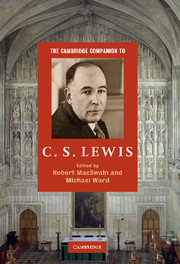16 - The Pilgrim’s Regress and Surprised by Joy
from Part III - Writer
Published online by Cambridge University Press: 28 November 2010
Summary
Both as a Christian and as a writer C.S. Lewis provokes divided opinions and perhaps never more so than in two accounts of his conversion to Christianity, The Pilgrim's Regress: An Allegorical Apology for Christianity, Reason and Romanticism (1933) and Surprised by Joy (1955). My focus in this essay will be not so much with the theological destination of these narratives (although I touch on this occasionally), but rather with two subsidiary themes. One is the manner of the description of the journey - Lewis's rhetoric. The other is that Romantic longing which drives the journey and which provokes hermeneutical and interpretative questions that remain important for our understanding of Romanticism and its place in the religious quest. Conversion to Christianity for Lewis, in both The Pilgrim's Regress and Surprised by Joy, seems largely an intellectual process and an individual one at that. But more important than any intellectual conclusions that he comes to is Lewis's persistent exploration of the theme of 'joy' lying at the heart of both these works, emanating from that 'private' Romanticism which he was to speak of (in the Regress) as being located in 'a particular recurrent experience which dominated my childhood and adolescence and which I hastily called 'Romantic' because inanimate nature and marvellous literature were among the things that evoked it'.
- Type
- Chapter
- Information
- The Cambridge Companion to C. S. Lewis , pp. 223 - 236Publisher: Cambridge University PressPrint publication year: 2010
- 1
- Cited by



